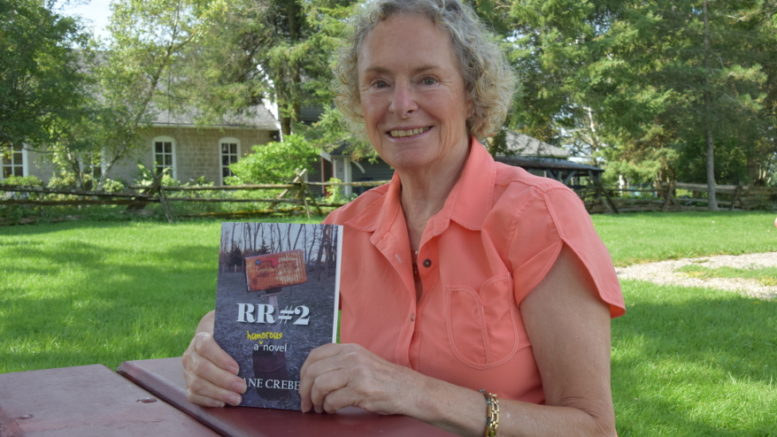By Seth DuChene
Editor
When it comes to life in a small rural village, Diane Creber writes from a position of experience.
She drew from her more than four decades of living in Wilton to write RR#2: A Humorous Novel, set in the fictional hamlet of Haystack.
Creber decided to write the book shortly after retiring from her business, Wilton Pottery, which she operated with her husband, Tim DeRose, since 1970. As it turned out, she came away from that experience with more than enough material with which to form the basis of a book. “As I sit at my potter’s wheel, my mind often wanders, and I’d sit there in the studio, looking out the window, and I’d see the characters in the village walking by, and I started writing stories in my head,” she said. “But, I never got an opportunity to put them down until I retired. I didn’t know if I could do it, but as soon as I started telling the stories, they just poured out. There were so many from this village.”
She said that work is still one of fiction, though some of the stories are loosely based on real events. “Some of them (have a basis in reality) and some of them are made up. If they were based on (true events), I changed them. I exaggerated the circumstances,” she said.
The ‘timeline’ of Haystack is eerily similar to that of the real-life Wilton. Like Wilton, Haystack lost its post office, and became known not by its historical name, but by its rural postal route of RR#2.
Creber said she moved to Wilton not long after the village lost its post office — followed by one of its churches as well as its schoolhouse. In fact, months after the school closed, Creber and her husband purchased the building and transformed it into a pottery studio.
“I had lived in Toronto, New York City and Montreal, and then I moved to here. I thought I had gone to another planet,” she recalled. “The hostility towards us because we were living in the schoolhouse that everyone over the age of 5 (had attended), was difficult. But we worked our way in, and by the time we moved (away), I was one of the ‘old characters.’”
She recalls one interaction with one of those ‘old characters’ of Wilton shortly after she moved there. “The couple that lived in (one) house only had horses — they didn’t have a car. The man told me that he was out of Wilton once: ‘I went to Kingston on my honeymoon. Never go back.’ That line is in the book, and that’s true. That’s what it was like.”
Since losing its post office, the village has enjoyed something of a revival, with new homes being built in and around the tiny hamlet located northeast of Odessa. Creber, however, retired and closed the pottery studio just more than a year ago and sold the building; with no land available in Wilton, she and her husband relocated to a lakeside property north of Sydenham.
Creber suggests that the stories in Haystack should strike a familiar tone for anyone who has lived in a country village. “I guess this village is typical of the small villages that are in eastern Ontario. What I’ve written about would probably apply to any small village. There are characters in all these small villages. They all have interesting stories,” she says.
RR#2 is available at Novel Ideas in Kingston and the Wilton General Store. Creber will be holding a book signing at Chapters in Kingston on Nov. 9.

